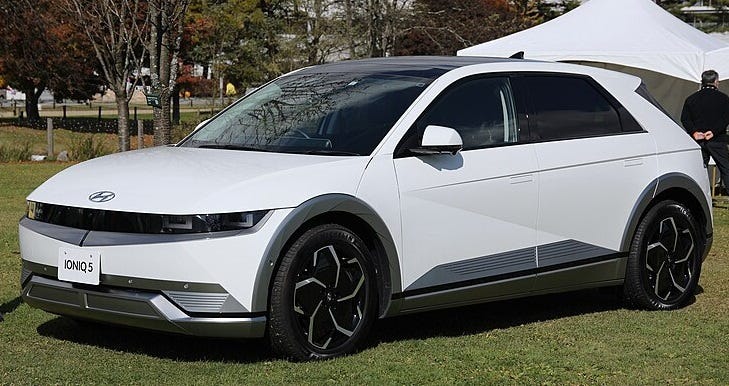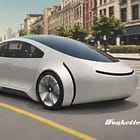Reports Of The EV Market's Death Have Been Greatly Exaggerated
Tesla's CEO grosses out buyers, but Ford, others see sales surge.

Good news! The media’s “Electric Vehicle Sales Slump” narrative — which was never really a slump, let alone a crash or a death spiral — appears to be in something of a slump itself, as recent sales figures for EV brands other than Tesla show that not only are EV sales not in the toilet, they’re still growing just fine, thanks.
Why yes, that’s what we told you in February, too: The rate of increase in EV sales slowed down a bit in late 2023 and early this year, which most industry analysts said seemed about what they’d expect with a new technology. The early adopters finally got their hands on the EVs they’d been looking for, and some American producers decided they needed to rethink their EV strategy a bit, including increased production of plug-in hybrids.
The slowdown in EV sales led to some frankly silly headlines. In February, CNN sought to explain “How EVs became such a massive disappointment.” In March, CNBC proclaimed “EV euphoria is dead. Automakers are scaling back or delaying their electric vehicle plans.” (Both articles eventually noted, several paragraphs in, that EV sales were still growing, just not as fast.)
All the while, people kept buying more EVs, and several automakers saw impressive sales growth, as Bloomberg reports (if that’s paywalled for you, here’s a good summary). That even includes Ford, which announced in March it was rethinking its EV strategy.
From the Bloomberg story:
For every sign of an EV slowdown, another suggests an adolescent industry on the verge of its next growth spurt. In fact, for most automakers, even the first quarter was a blockbuster. Six of the 10 biggest EV makers in the US saw sales grow at a scorching pace compared to a year ago — up anywhere from 56% at Hyundai-Kia to 86% at Ford. A sampling of April sales similarly came in hot.
The article also includes this helpful graph, illustrating increased sales of EVs for several automakers in the first quarter of 2024 compared to a year ago:
The article notes that consumers are doing their homework, “flocking to some brands in record numbers while turning their backs on those with inferior battery range, slower charging and high prices,” according to auto industry analyst Stephanie Valdez-Streaty of Cox Automotive.
Also, keep in mind that this chart, too, is just a snapshot of where things are; the article also points out that temporary delays in bringing out new vehicles won’t last forever, but they “added to the perception of a market running out of steam.”
For example, GM’s decline in sales was mostly due to its long-planned discontinuation of the popular, affordable Chevy Bolt, which was supposed to be succeeded by the more advanced, still small Equinox EV. But rollout of the Equinox EV and other new models was embuggered by production issues with GM’s Ultium battery platform, which appear to be finally resolved. Bloomberg adds that
For the rest of 2024, GM appears to be on the brink of becoming the biggest driver of EV growth in the US. The Detroit automaker has committed to electrifying some of its biggest brands, which are finally reaching production after years of delays. That includes a $35,000 Equinox SUV and its sibling Blazer, as well as Silverado and GMC Sierra electric pickups with up to 450 miles of range.
In fact, the article suggests that were it not for those delays in Ultium production, “the mood around the US EV market might have been exuberant going into 2024.” GM now says it expects to produce between 200,000 and 300,000 EVs using the Ultium platform this year.
Ford, too, saw greatly increased sales in May of its Mustang Mach-E and F-150 Lightning models, even as it announced earlier this year it planned to shift toward building more small, less-expensive EVs and to produce more hybrid models. Ford’s May EV sales were up by 64.7%, partly in response to the price cuts that some said were proof that nobody could even give away EVs. The Mach-E crossover SUV had the strongest sales, followed by the F-150 Lighting full-sized pickup.
And because a lot of small businesses and government agencies want to go electric, Ford is also selling a lot of the basic “Pro” edition of the Lightning, and seeing higher demand for its electric delivery van, the E-Transit.
All told, Ford’s EV sales — 37,200 through the first five months of 2024 — have nearly doubled since the same period in 2023, when it sold 19,809 electric vehicles. (That’s up 87.8 percent if you want to know how “almost” the increase was.) Some slump!
Finally, there’s Hyundai/Kia, which unlike other US automakers has stayed pedal to the metal, or the nice carpeting, with its EV plans. Hyundai’s electric vehicles, including its conventional and plug-in hybrid models, are up 50 percent since last year, while its all-electric models are selling 42% more than this time last year.
Hyundai’s most popular EV, the Ioniq 5, had its best sales month ever in May, with 4,449 sold — up 82 percent from last year. And that’s for a model that’s been out for two years and doesn’t qualify for the federal $7,500 point-of-sale tax credit.
The secret sauce is leasing, according to InsideEVs, because a whole bunch of people now know about a kind of loophole to the domestic content and income limits on EV purchases. In fact, according to Hyundai officials, some 60 to 70 percent of customers are leasing them instead.
Across the industry, leasing is growing in popularity, partly because EV technology is rapidly advancing, and some people want the latest tech without having to sell their older EV. But it’s largely thanks to a separate tax incentive provision of the Inflation Reduction Act that Joe Manchin didn’t get his paws on as he did with the credits for consumer purchases. Commercial EV buyers — i.e. leasing companies — can take a relatively unrestricted $7,500 tax credit and pass the savings on to customers. Heck, I may end up leasing later this year for exactly those reasons.
Oh, hey, and sales of used EVs are also booming, CNN reported yesterday, due to general demand for EVs, inventory turnover in the leasing and rental markets, and because most used EVs qualify for a $4,000 point-of sale tax credit at participating dealers. But we guess CNN editors don’t read Bloomberg or the EV trade press, because the headline on CNN’s used EV story is “While new electric vehicle sales are slowing, used sales are ramping up.” Jeez, CNN, keep up, will you?
PREVIOUSLY!
[Clean Technica / Bloomberg / Elektrek / InsideEVs / Consumer Reports / CNN]
Yr Wonkette is funded entirely by reader donations. If you can, please become a paid subscriber. But if a one-time donation makes more sense for you, well then that would certainly give us a charge, too!







To indulge my ADHD tendencies, I've taken to counting EVs as I drive/ride my ebike around Boise. Just getting a fast food lunch yesterday, I saw 5 of them, and for once they weren't mostly Teslas (2 newish Nissan Leafs, one older one, a Tesla, and a Rivian pickup). Since I started this very unscientific lookin' around, I don't think I've ever not seen an EV; the most for one longish shopping trip was 22.
I know this is supposed to be an uplifting post about EVs, but can we still laugh our complete asses off at the Cybertruck?